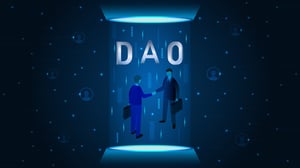The internet is changing and the online world is heading toward a decentralized internet known as Web 3.0.
Web 3.0 is the latest iteration of the world wide web and is swooping in to take over the centralized web 2.0 space that the world has become accustomed to. At its core, Web 3 is a decentralized internet designed to challenge the dominance of tech giants such as Meta and Google, putting data and power back into the hands of the user. Essentially, this version of the internet allows user data to be distributed across networks and no single entity owns this information.
Before we dive into the decentralization of the internet, and its focus on data privacy - let's take a look at what came before it and what propelled this very real user need.
.jpeg?width=584&name=shutterstock_1811727022-min%20(1).jpeg)
The Evolution of the Web
The web has evolved over the years, from basic search functionality through Ask Jeeves to social networking, online shopping, and global gaming. Today, the internet is unrecognizable from what we knew of it in the 90s and early 2000s and these significant shifts can be partitioned into three stages: Web 1.0. Web 2.0 and now Web 3.0.
Web 1.0
Web 1.0 is the first iteration of the internet and in this version, most users were consumers of content while the creators were developers who built websites that contained this content. Data and content were served from a static file system rather than a database and websites didn't have much interactivity or engagement - if at all.
Web 2.0
Web 2.0 is the interactive and social web we have all come to know. In this iteration of the internet, you don't have to be a developer to participate in the creation process as many apps allow users to be their own content creators.
This version of the internet is great but there are many areas that require reform and change. The most important being the centralization of Web 2.0. In this version of the internet, users are at the mercy of large organizations such as Meta, YouTube, and Google. As these organizations offer a “free” service to users, they began to monetize their efforts and this is where the centralization of the internet began.
Instead of charging users money for their services, these organizations started to track their browser history in order to gain valuable marketing information to launch highly targeted ad campaigns. Essentially, users are giving pieces of their data to third-party entities in order to gain access to products and services.
Some of these large organizations also have their own data centers where they can save user data - which leads to severe security and privacy issues and users have started to take notice and are demanding change.
Enter Web 3.0.
Web 3.0 and Data Privacy
The last few years, data privacy has become a major concern as users have become increasingly aware of the implications that come with the sharing of their data by large companies.
This goes further than internet users and has reached politicians and lawmakers, raising questions about how user data is being used by these organizations. And this is where Web 3 comes into play.
Web 3 creates a decentralized online ecosystem built on blockchain technology and is designed to repair what's currently wrong with the internet. Web 3 combines machine learning and artificial intelligence, enabling real-time human communication. But the best part? Web 3 allows people to own their own data.
Web 3 will introduce innovations in the space, rendering the current online environment outdated. As Gavin Wood, referred to as the Father of Web 3 stated: “Platforms and programs created on Web3 won’t be owned by a central gatekeeper, but rather by users.”
There will be no central gatekeeper due to blockchain technology, the same technology that allows for cryptocurrency and NFTs. Because of this, there will be no need for large corporations and data centers. Rather, data will be stored and spread across multiple platforms and devices - and this decreases the possibility of large data leaks.
Web 3.0 is dedicated to re-decentralize the World Wide Web with a variety of applications that give users the ability to control their data. This internet is designed to give people back their power.
How We Can Help
Those who understand and appreciate the magnitude of the Web 3.0 revolution can stand to benefit. Similar to those who embraced the internet (Web 1.0) back in the 90s and the social media era (Web 2.0), first-movers will have a clear advantage with fortune almost certainly favoring the brave.
Nexa is at the forefront of Web 3.0 commercial opportunities providing a range of services for leading brands as they transition into the Web 3.0 arena.
Contact Nexa for all your Web 3 needs today.
%20(1).png?width=2701&height=607&name=BRC_NEXA_LOGO_BLACK%20%26%20VIOLET%20(1)%20(1).png)
%20(1).png?width=2701&height=607&name=BRC_NEXA_LOGO_WHITE%20(2)%20(1).png)


![The Cost of Social Media Marketing in Dubai, Abu Dhabi and Doha [Updated 2023]](https://blog.digitalnexa.com/hs-fs/hubfs/Copy_of_11.16.2014.png?length=100&name=Copy_of_11.16.2014.png)









Comments